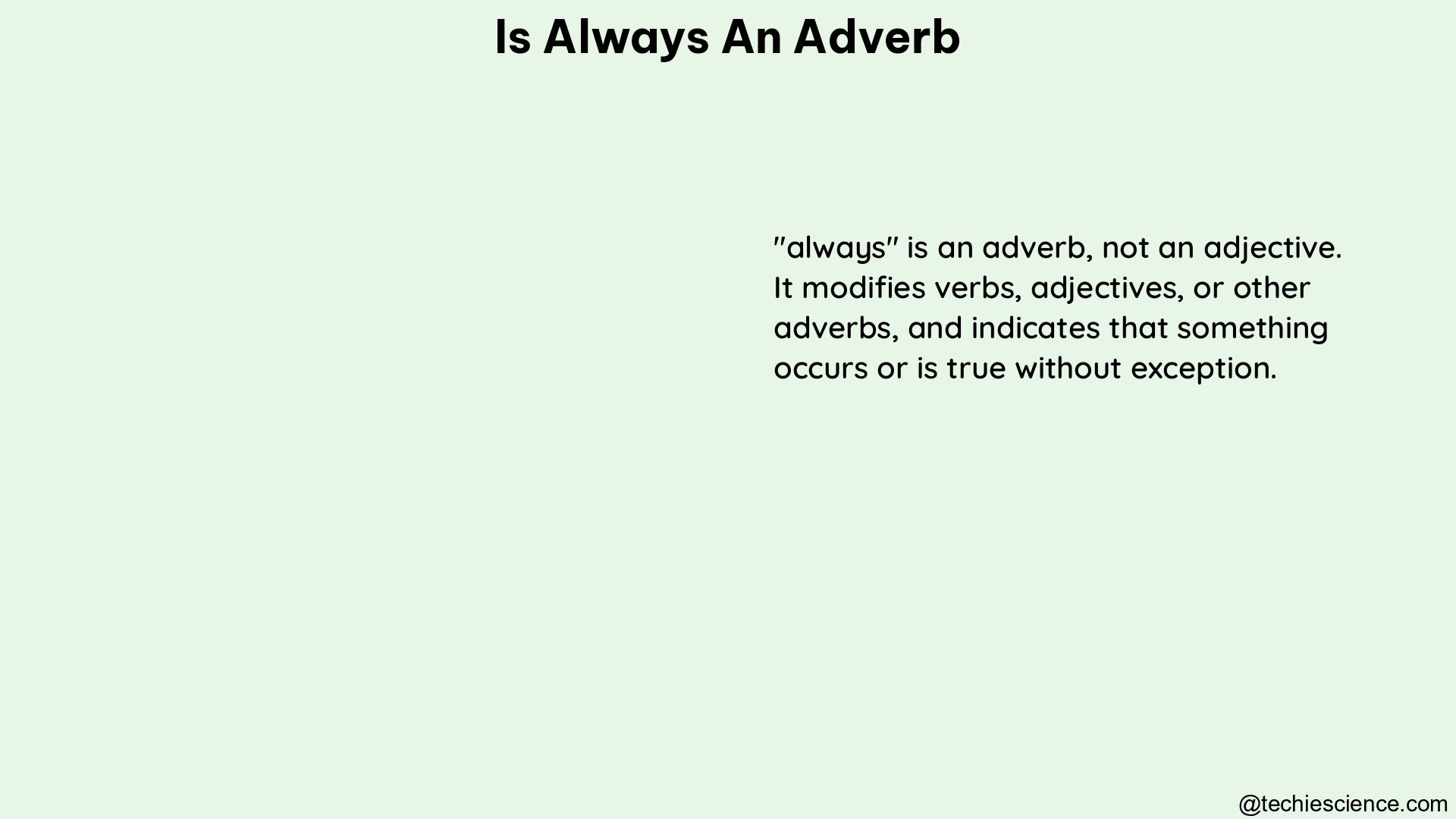“Always” is an adverb that plays a crucial role in the English language, indicating the frequency or consistency of an action. As an essential part of speech, understanding the grammatical specifications, theoretical explanations, and advanced details surrounding the use of “always” is crucial for effective communication and writing. This comprehensive guide will delve into the intricacies of “always” as an adverb, providing a wealth of information to help you master its usage.
Grammatical Specification
Definition
“Always” is an adverb that describes or modifies verbs, indicating that an action occurs without exception, continually, or repeatedly. It is used to show the frequency of an action, suggesting that something happens all the time, without fail.
Usage
The primary function of “always” is to modify verbs, providing information about the frequency or consistency of an action. It is used to convey the idea that an event or behavior occurs consistently, without any exceptions.
Placement
When using “always” in a sentence, it should be placed before the verb it is modifying. This placement ensures that the adverb clearly indicates the frequency or consistency of the action.
Examples
- I always arrive on time for class.
- She always speaks her mind.
- There’s always somebody at home in the evening.
Theoretical Explanation

Adverbial Function
“Always” functions as an adverb, providing information about the frequency or manner of an action. It is used to describe the consistency or regularity with which an event or behavior occurs.
Idiomatic Expressions
“Always” is often used in idiomatic expressions, such as “can/could always” and “there’s always,” to suggest possible courses of action or the availability of options.
Negative Statements
When using “always” in negative statements, it is important to be cautious, as it can sometimes sound extreme or exaggerated. In such cases, it may be more appropriate to use alternative adverbs like “frequently” or “often” to convey the intended meaning.
Advanced Details
Collocations
“Always” often collocates with verbs that indicate consistent behavior, such as “arrive,” “speak,” and “do.” These collocations help to reinforce the idea of the action occurring without exception.
Pronunciation
The pronunciation of “always” is /ˈɔlweɪz/ in both American and British English. This consistent pronunciation helps to maintain the adverbial nature of the word.
Etymology
The word “always” originated from Middle English, derived from the genitive case of “all way,” giving it the sense of “at every time.” This historical background provides insight into the adverbial function of the word.
Examples and Tips
Examples
- They always stay friendly no matter how frustrating the situation is.
- She always makes sure the room is tidy before leaving.
Tips
- Avoid using “always” before a noun, adjective, or other adverb, as it is not the appropriate grammatical usage.
- Be cautious with double negatives and try to avoid using “always” if it is not necessary, as it can lead to overly strong or exaggerated statements.
References
- Promova. (n.d.). What part of speech is the word always? Retrieved from https://promova.com/what-part-of-speech/always
- Oxford Learners Dictionaries. (n.d.). always adverb. Retrieved from https://www.oxfordlearnersdictionaries.com/us/definition/american_english/always
- Cambridge Dictionary. (n.d.). Always – English Grammar Today. Retrieved from https://dictionary.cambridge.org/us/grammar/british-grammar/always
- Oxford Learners Dictionaries. (n.d.). always adverb. Retrieved from https://www.oxfordlearnersdictionaries.com/us/definition/english/always

Hi…..I’m a graduate with a Bachelor’s degree in English Literature. I wish to do a Masters in the same field someday and continue my career in Academia.
Let’s connect through LinkedIn: